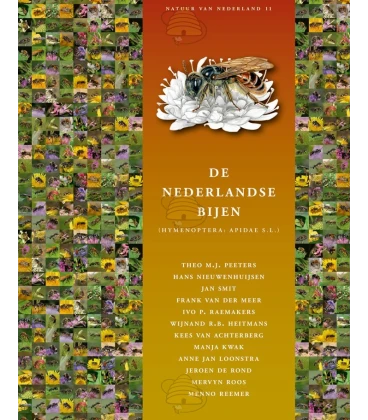The Dutch bees
€ 49,95
De Nederlandse Bijen is a beautiful book that, across 544 pages, describes 350 species of Dutch wild bees. A must-have on every beekeeper’s bookshelf. Interesting for anyone with an interest in bees. Bees covered include masked bees, plasterer bees, pantaloon bees, as well as bumblebees, etc.! Hardcover, bound. Dimensions: 23 x 30 cm.
ISBN: 9789050114479
Customer ratings and reviews
From the publisher:
Bees are known as industrious insects that produce honey. However, only one bee species does that: the honey bee. Few people know that, besides the honey bee, another 357 bee species occur in the Netherlands, such as masked bees, plasterer bees (cellophane bees), pantaloon bees, and bumblebees.
Apart from their shared preference for flowers, each bee species has its own habits. One gathers pollen from dandelions, another from field scabious. One digs nests in the ground, another settles in empty snail shells. This diversity is found everywhere, even on balconies in the middle of the city, where mason and leafcutter bees do their handiwork. For the first time, all knowledge about Dutch bees has been brought together in a single, magisterial book.
Bees could use some attention, because they are not doing well. No fewer than 138 species have declined in their distribution, and 34 of these have even disappeared entirely from the Netherlands. This is worrying, because bees play an important role as pollinators of flowers, both in nature and in agriculture and horticulture.
Therefore, full attention now for more than 350 species of Dutch wild bees in volume 11 of the much-praised series `Nederlandse Fauna`. The Bees of the Netherlands is an indispensable source of information for nature and insect enthusiasts, entomologists, policymakers, land managers, farmers, beekeepers and apiarists.
The year 2012 was the Year of the Bee. Bees play an indispensable role for people and nature. Worldwide, bee colonies are struggling. If more people know something about bees, together they can help protect these insects better.


